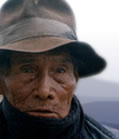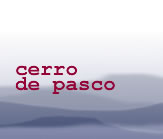THEMES IN THIS
TESTIMONY
Communications

Community Activities

Compensation

Employment and Income

Environment

Health

Identity

Justice and crime

Livestock

Migration

Click on arrows
to find more
testimonies
featuring
these themes
|
|
Sex
|
male
|
|
|
Age
|
80
|
|
|
Occupation
|
ex-community leader
|
|
|
Location
|
San Antonio de Yauli
|
|
|
Date
|
1995
|
|
summary
At 80 years old, Urbano has an impressive lineage. His grandparents were among the founders of Yauli and his family have been comuneros (registered community members with rights and responsibilities) ever since. He's outlived all but one of his children and he can't remember how many grandchildren and great grandchildren he has in total.
Like many of the elder members of these communities, he recognises the changes as a result of the mines in terms of social values, livelihoods, customs, reduced support for health care, etc. In the early days, he was a porter for the mines, transporting the minerals by llama - nowadays it's all by road. He also worked in the mines, on contracts, for 20 years.
He talks of the history of the mines: the founding of the Volcan mining company and of the smelting works at La Oroya which forced all the smaller mining operations to close and obliged people to move to the bigger town. He describes the polluted rivers, the effects on the livestock and the community’s mostly thwarted attempts to get any real compensation from the Ministry of Agriculture.
He remembers the days of the Cerro de Pasco Corporation and how miners have always had a better deal than comuneros. But he talks proudly of his time as a community leader and how he bought community lands off the Corporation and established a cooperative to raise cattle and pigs. But even this is failing them now because of the lack of resources, people’s indifference, and the damage caused by the noxious fumes. He urges the younger members of the community to protest and claim what is rightfully theirs - but he is doubtful of their willingness to put the community first. Many of Urbano’s answers are quite short (which may be a reflection of his considerable age), and the interviewer sometimes seems to labour a point – nevertheless, it’s a very human interview.
detailed breakdown
|
You will need a password from Panos to view the full
transcript of the interview. To apply for a password, click here.
Once you have a password, click here to go to the beginning
of the transcript. You can also click on any section of the
breakdown of content below and go straight to the
corresponding part of the transcript.
|
| Section 1 |
Family history
|
| Section 2 |
The animals he inherited from his parents have almost all perished from pollution-related illness
Disappearing customs and solidarity - changing priorities of young people (pay more attention to unions than religion).
|
| Section 3 |
Still an active comunero
History of community: land titles lost during war with Chile - Yauli re-recognised in 1933; compensation for the polluted lands is a pittance and once shared among the comuneros hardly worth a thing.
|
| Section 4 |
Description of livestock illness (lead poisoning). Compensation agreements date back to 1925; says Cerro de Pasco Corporation (CdePC) benefited the community more than Centromin.
|
| Section 5 |
Llamas were used to transport minerals (Urbano was a muleteer) then came the railroads and now heavy lorries
|
| Section 6-7 |
Laments broken promises made by government and mining companies alike.
Yauli’s streets badly affected by increased traffic servicing the mines
Yauli was relegated from province to district when the smelter was built at La Oroya and as a result is less favoured in terms of resources etc.
|
| Section 8 |
Effects of contaminated water.
|
| Section 9 |
History of mines - development from small privately-owned operations to conglomerates: La Volcan and CdePC
|
| Section 10 |
Yauli had three smelters before the one built in La Oroya forced the smaller ones to close.
Impact of mining expansion: numbers of campesinos have dwindled “there are a lot of my fellow villagers here who no longer enjoy keeping livestock at all. More of them are miners and others have gone to Lima.”
|
| Section 11-12 |
Sadness at the lack of life and opportunity in Yauli; urges young people to fight for their community as he did, when as leader he managed to force the government to expropriate land from CdePC and then bought it for Yauli
|
| Section 13 |
As a result, set up the cooperative but the reality has failed to live up to ideals - it yields little profit. Disappointment with management, and also fumes cause livestock deaths.
|
| Section 14 |
Talks proudly of the public protests against the fumes that he would initiate were he president of the cooperative.
Livestock as a way of life is disappearing: “We had milk, we had cheese. Now who knows about cheese? Who knows about milk? …You can’t even buy a cup of milk. There are no animals.”
|
| Section 15 |
Family longevity - his grandfather died at 118. Proud of his own good health. Interviewer seems amazed that he suffered no ill-effects from working in the mines (almost guilty of leading the narrator, clearly wanting him to cite problems). Urbano managed to work at surface-level which was safer/ healthier.
|
| Section 16 |
Couldn’t give up a life with livestock, but has to contend with increased animal theft as well as the pollution. He finishes by noting how little wealth he’ll leave behind when he's gone – but “I’m leaving land, I’m leaving titles…”
|
|


